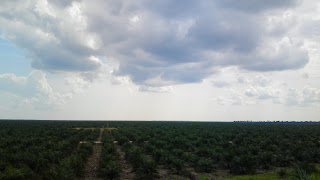 From 10,000 feet in the air, the hinterlands of Sarawak is all green, with rivers and streams cutting through its vast, vast expanse. The sinner has been awake since before 5am, and he is tired already. And the day hasn't even started properly! Oh dear...
From 10,000 feet in the air, the hinterlands of Sarawak is all green, with rivers and streams cutting through its vast, vast expanse. The sinner has been awake since before 5am, and he is tired already. And the day hasn't even started properly! Oh dear... Then suddenly, the city of Sibu materialises itself amidst the rainforest. I didn't know this, but this is as close as I will ever get to the city. Or to any city, come to think of it!
Then suddenly, the city of Sibu materialises itself amidst the rainforest. I didn't know this, but this is as close as I will ever get to the city. Or to any city, come to think of it! Landed! Safe and sound. There is nothing like air-travel to make you feel closer to your mortality! Wuu HUU!
Landed! Safe and sound. There is nothing like air-travel to make you feel closer to your mortality! Wuu HUU! The gritty, rugged and tough estate managers. It is a hard, hard life with hard, hard work on a daily basis for these men. They are responsible for the welfare of hundreds of workers and milions of dollars in investments, and it is no walk in the park.
The gritty, rugged and tough estate managers. It is a hard, hard life with hard, hard work on a daily basis for these men. They are responsible for the welfare of hundreds of workers and milions of dollars in investments, and it is no walk in the park.  The vast horizon of the estate wearies my eyes, so used as I am to the short, stunted views of urban life. It rained a little in the evening.
The vast horizon of the estate wearies my eyes, so used as I am to the short, stunted views of urban life. It rained a little in the evening. With roads built of solid granite quarried from the earth...
With roads built of solid granite quarried from the earth... ... You would need transportation like these. But even on these pick-ups, the journey was less of a drive, and more of being tumbled about in a washing machine. I was bouncing all over the place. "Oh, you should have been here, before we had these road paved with granite. It was even worse!", said Ariffin. "My head was hitting the roof of the car!"
... You would need transportation like these. But even on these pick-ups, the journey was less of a drive, and more of being tumbled about in a washing machine. I was bouncing all over the place. "Oh, you should have been here, before we had these road paved with granite. It was even worse!", said Ariffin. "My head was hitting the roof of the car!"  These strange monolith structures dot the countryside of Sibu. They are bird-hotels and built to intice swiftlets to nest and roost there. The birds' nests are then 'harvested' for local consumption but mostly for export to mainland China and the teeming Chinese diaspora all over the globe. Such is the demand for these aviary delicacy that there is a small hotel which was converted into a bird-hotel. Apparently, hosting swiftlets is more profitable than human guests.
These strange monolith structures dot the countryside of Sibu. They are bird-hotels and built to intice swiftlets to nest and roost there. The birds' nests are then 'harvested' for local consumption but mostly for export to mainland China and the teeming Chinese diaspora all over the globe. Such is the demand for these aviary delicacy that there is a small hotel which was converted into a bird-hotel. Apparently, hosting swiftlets is more profitable than human guests.  In the second estate, we could see small bunches of palm oil fruit by the roadside. These are the preliminary harvesting which they call 'scout harvesting'. Scout harvesting is intended to pluck the first fruits from a young tree. The quantity is very small, but it is still necessary because if left to rot on the tree, it may cause all sorts of fungal problems to the young plant.
In the second estate, we could see small bunches of palm oil fruit by the roadside. These are the preliminary harvesting which they call 'scout harvesting'. Scout harvesting is intended to pluck the first fruits from a young tree. The quantity is very small, but it is still necessary because if left to rot on the tree, it may cause all sorts of fungal problems to the young plant. Scratched upon a palm stalk is the number of the lot or grid from which the scout harvests were picked. It is a poignant symbol of the difficulty and hardship faced by these men who are planting and scratching for wealth from the fertile peat soil of this locality. From a plant that is not even originally from this region (oil palm is indigenous to Africa).
Scratched upon a palm stalk is the number of the lot or grid from which the scout harvests were picked. It is a poignant symbol of the difficulty and hardship faced by these men who are planting and scratching for wealth from the fertile peat soil of this locality. From a plant that is not even originally from this region (oil palm is indigenous to Africa). Have a lovely day, sunshine. I still have one more day here.
Pax Taufiqa.

No comments:
Post a Comment